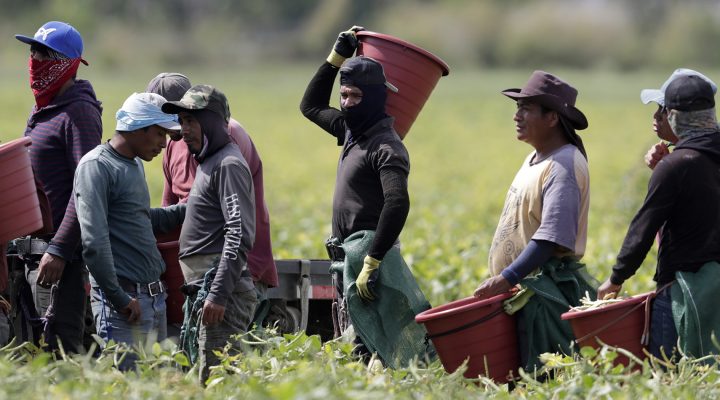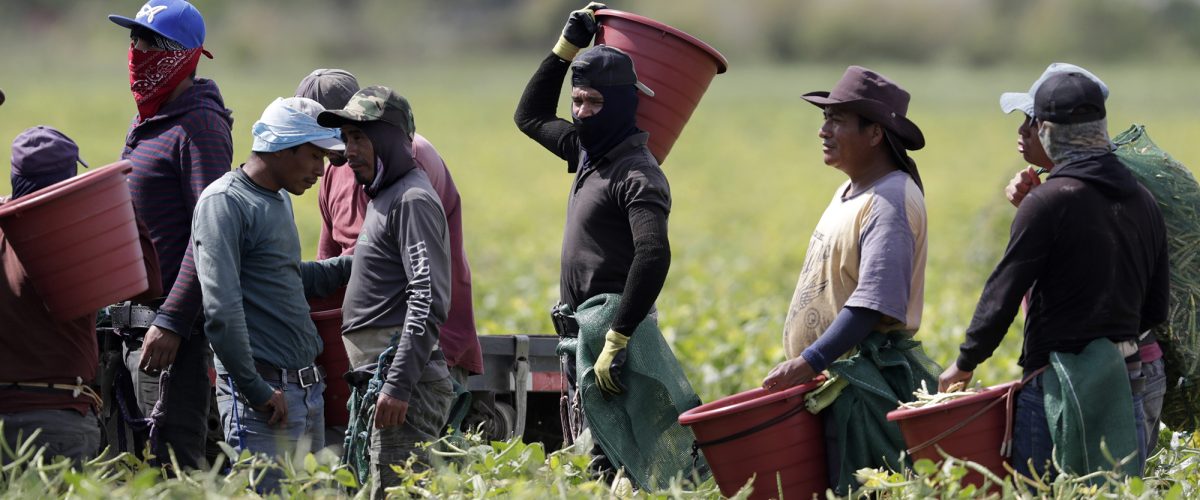Those who think immigrants are stealing American jobs not only are wrong but are imperiling the American economy with their unsubstantiated views, a panel of agricultural leaders said July 27.
“Each year, we see the end of generational farms because it’s harder for our members, and growers across the country, to find a reliable domestic workforce,” said Joel Anderson, executive director of the Idaho-based Snake River Farmer’s Association.

Joel Anderson
He was one of the panelists on a webinar organized by the Alliance for New Immigration Consensus to support the Farm Workforce Modernization Act., which has been approved by the U.S. House of Representatives but remains pending in the Senate. The bill would revive a flagging U.S. economy, improve border protections and strengthen national security, the panel of business owners, farmers and consumer advocates said.
Despite the fears of losing American jobs to immigrants, the reality is that most Americans are unwilling to work on the nation’s farms and ranches, the industry experts reported.
“We’ve gotten a glimpse of what food shortages look like, and I’m not talking about a run on toilet paper,” Anderson said. “We have seen bare shelves in our grocery stores that most of us thought we would never see in our lifetimes here in America. These are real problems. These are real threats. And we see in real time the importance of taking action now to ensure food security and agricultural independence in our country. Our ability to feed our people ourselves is key to America’s national security.”
One of the biggest roadblocks to adequate workforce levels, panelists agreed, is the difficulty in obtaining H-2A visas for temporary agricultural laborers, leaving many farm and ranching operations unable to harvest crops on time, or at all.
“We have never had a local worker finish a season.”
To claim the temporary visas rob Americans of the opportunity to work ignores reality, explained Tara Smith, a partner with Smith Farms of Maine and Florida. “H-2A requires that we post jobs locally, but we have never had a local worker finish a season. We provide housing, transportation, pay cooks and offer almost double the federal minimum wage, but there are no interested local workers in any of our production centers on the East Coast.”
Across the country in Idaho, members of the Snake River Farmer’s Association have applied for approval to hire a total of 5,800 foreign workers for the 2022 season because only 26 Americans have applied for the jobs so far, Anderson said.
“In the spring of 2020, the National Council of Agricultural Employers did a similar survey of their membership,” Anderson said. “Of the 98,000 positions those employers needed to fill, those employers received only 337 domestic applicants.”
Yet the administrative hoops and delays involved in applying for temporary visas for seasonal foreign workers frequently prevents employers from hiring enough workers in time for planting and harvesting, Smith added. That’s why alliance members are urging the U.S. Senate to pass the farmworkers act.
“Those scenarios are avoidable by making it easier for growers to act quicker,” she said.
The panel also countered opponents’ assertions that permitting seasonal migrant workers into the U.S. weakens border security.

Doug Baker
In fact, the opposite is true, said Doug Baker, former special assistant for homeland security in the George W. Bush administration, former senior director for border and transportation security policy and a leader at the Council on National Security and Immigration.
“One of the things (Congress) can do that would greatly enhance our security is create worker programs for farmworkers,” Baker said.
Doing so also would help alleviate backups at the southern border crossings, he added. “I remember long conversations with Border Patrol officers who said the ability for farm workers to become legal reduced the amount of traffic they would see going between ports of entry. That was a key takeaway then and it still resonates now.”
Passage of the Farm Workforce Modernization Act also would help restore the nation’s food security, said Lori Taylor, founder and CEO of The Produce Moms of Indiana, a consumer advocacy organization.
“We know that comprehensive immigration reform will help drive down the cost of goods in our country.”
The anemic seasonal workforce is contributing to higher food prices, which in turn drives up inflation and hunger, she said. “Two of the most resilient communities are our farmers and our moms, but we are at the point where no one can continue to fight against these grocery store prices. We know that comprehensive immigration reform will help drive down the cost of goods in our country.”

Lori Taylor
Federal legislators must act before the midterm elections to address these dire problems, said moderator Daniel Garza, president of the LIBRE Initiative and a member of the Alliance for New Immigration Consensus.
“In poll after poll, a supermajority of American voters expressed their support to have Congress deliver immigration solutions that create a reliable and a certain workforce for our nation’s farmers and ranchers,” Garza said. “Congress right now has that rare opportunity for bipartisan action in passing legislation that helps farmers.”
According to a recent report on National Public Radio, the bill has bipartisan support, although Republicans are divided on whether a provision in the bill would allow workers to sue employers. The primary opponent of the bill is the American Farm Bureau Federation, a highly influential lobbying group in Washington, D.C.
Related articles:
America’s economy urgently needs more immigrant labor, experts explain
CBF joins broad coalition urging Congress to pass immigration reform this year


